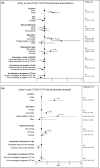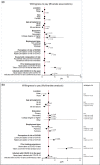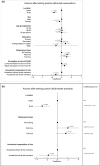Values and preferences of the general population in Indonesia in relation to rapid COVID-19 antigen self-tests: A cross-sectional survey
- PMID: 35332616
- PMCID: PMC9115524
- DOI: 10.1111/tmi.13748
Values and preferences of the general population in Indonesia in relation to rapid COVID-19 antigen self-tests: A cross-sectional survey
Abstract
Objectives: Home diagnostics are essential to assist members of the general population become active agents of case detection. In Indonesia, a country with an over-burdened healthcare system, individuals could use rapid SARS-CoV-2 antigen tests to self-detect COVID-19. To assess the general population's values and attitudes towards SARS-CoV-2 self-testing, a survey was conducted in mid-2021 in Jakarta and the provinces of Banten and North Sulawesi.
Methods: This was a quantitative survey that approached respondents in >600 randomly selected street-points in the three study geographies in July-August 2021. A 35-item questionnaire was used to collect data on key variables, such as likelihood to use a SARS-CoV-2 self-test, willingness to pay for a self-test device, and likely actions following a positive self-test result. Bivariate and multivariate regression analyses were performed.
Results: Of 630 respondents (318 were female), 15.53% knew about COVID-19 self-testing, while 62.70% agreed with the idea of people being able to self-test at home, unassisted, for COVID-19. If self-tests were available in Indonesia, >60% of respondents would use them if they felt it necessary and would undertake regular self-testing for example weekly if recommended. Upon receiving a positive self-test result, most respondents would communicate it (86.03%), request post-test counselling (80.79%), self-isolate (97.46%), and/or warn their close contacts (90.48%).
Conclusions: The use of rapid SARS-CoV-2 antigen detection tests for self-testing appears acceptable to a majority of the Indonesian public, to learn whether they have COVID-19. Self-testing should be prioritised to complement to an over-burdened healthcare system by helping the public, asymptomatic individuals included, become agents of change in epidemiological surveillance of SARS-CoV-2 in their communities.
Keywords: COVID-19; Indonesia; SARS-CoV-2 testing; home diagnostics; self-testing; survey.
© 2022 The Authors Tropical Medicine & International Health Published by John Wiley & Sons Ltd.
Figures



Similar articles
-
SARS-CoV-2 self-testing in Peru: a cross-sectional survey of values and attitudes of the general population.BMJ Open. 2023 Jul 5;13(7):e068980. doi: 10.1136/bmjopen-2022-068980. BMJ Open. 2023. PMID: 37407037 Free PMC article.
-
Self-testing for SARS-CoV-2 in São Paulo, Brazil: results of a population-based values and attitudes survey.BMC Infect Dis. 2022 Sep 2;22(1):720. doi: 10.1186/s12879-022-07706-7. BMC Infect Dis. 2022. PMID: 36056299 Free PMC article.
-
People's willingness to use COVID-19 self-testing in Nigeria: a cross-sectional survey.BMJ Open. 2023 Jan 30;13(1):e063323. doi: 10.1136/bmjopen-2022-063323. BMJ Open. 2023. PMID: 36717135 Free PMC article.
-
Effectiveness of tests to detect the presence of SARS-CoV-2 virus, and antibodies to SARS-CoV-2, to inform COVID-19 diagnosis: a rapid systematic review.BMJ Evid Based Med. 2022 Feb;27(1):33-45. doi: 10.1136/bmjebm-2020-111511. Epub 2020 Oct 1. BMJ Evid Based Med. 2022. PMID: 33004426
-
Laboratory Readiness and Response for SARS-Cov-2 in Indonesia.Front Public Health. 2021 Jul 19;9:705031. doi: 10.3389/fpubh.2021.705031. eCollection 2021. Front Public Health. 2021. PMID: 34350153 Free PMC article. Review.
Cited by
-
Hesitancy to Undergo SARS-CoV-2 Rapid Antigen Testing in China: Nationwide Cross-sectional Study.JMIR Public Health Surveill. 2023 May 1;9:e43555. doi: 10.2196/43555. JMIR Public Health Surveill. 2023. PMID: 36888911 Free PMC article.
-
Public's Willingness to Perform COVID-19 Self-Testing During the Transition to the Endemic Phase in Malaysia - A Population-Based Cross-Sectional Study.Risk Manag Healthc Policy. 2023 Nov 21;16:2505-2519. doi: 10.2147/RMHP.S439530. eCollection 2023. Risk Manag Healthc Policy. 2023. PMID: 38024502 Free PMC article.
-
Implementation pilot study of community self-testing for COVID-19 among employees of manufacturing industries and their household members in 2022 to 2023.PLOS Glob Public Health. 2024 Jun 5;4(6):e0003269. doi: 10.1371/journal.pgph.0003269. eCollection 2024. PLOS Glob Public Health. 2024. PMID: 38838031 Free PMC article.
-
Values of COVID-19 Self-Testing among Urban and Rural South Africans: A Cross-Sectional Survey.Prev Med Rep. 2023 Apr;32:102114. doi: 10.1016/j.pmedr.2023.102114. Epub 2023 Jan 18. Prev Med Rep. 2023. PMID: 36686721 Free PMC article.
-
Are Kenyans Likely to Use COVID-19 Self-Testing Kits? Results From a Cross-Sectional Survey.Int J Public Health. 2022 Aug 26;67:1604918. doi: 10.3389/ijph.2022.1604918. eCollection 2022. Int J Public Health. 2022. PMID: 36090834 Free PMC article.
References
-
- Setiati S, Azwar MK. COVID‐19 and Indonesia. Acta Med Indones. 2020;52(1):84–9. - PubMed
-
- Johns Hopkins Coronavirus Resource Center . Indonesia: COVID‐19 Overview 2021. Available from: https://coronavirus.jhu.edu/region/indonesia
-
- Hendarwan H, Syachroni S, Aryastami NK, Sa'udi A, Susilawati MD, Despitasari M, et al. Assessing the COVID‐119 diagnostic laboratory capacity in Indonesia in the early phase of the pandemic. WHO South East Asia. J Public Health. 2020;9(2):134–40. - PubMed
MeSH terms
LinkOut - more resources
Full Text Sources
Medical
Miscellaneous

